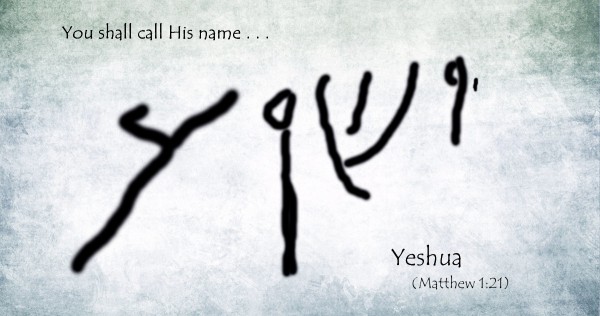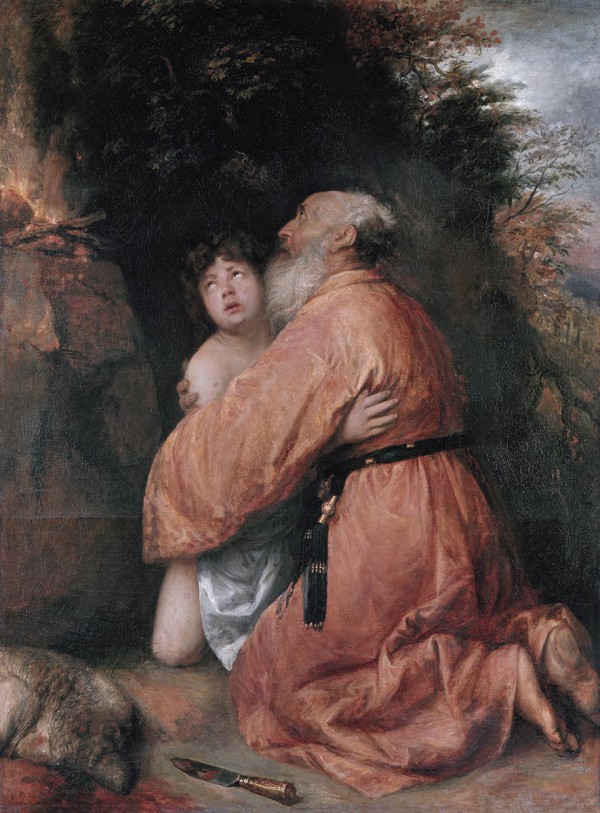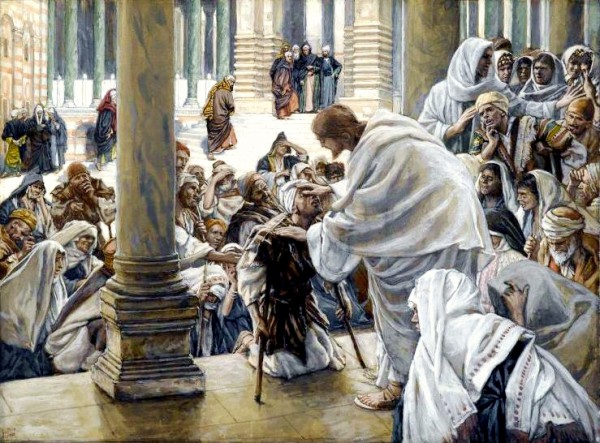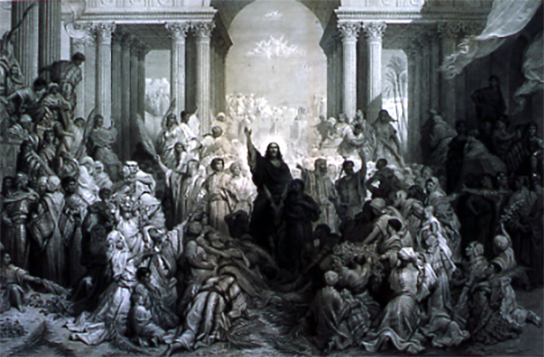“The Spirit of the LORD is upon me, for he has anointed me to bring Good News to the poor. He has sent me to proclaim that captives will be released, that the blind will see, that the oppressed will be set free.” (Luke 4:18)
Yeshua — Jesus in English — is the Name above all Names that multitudes cry out to every day for safety, security, peace, and healing.
“There is no one else.” (Acts 4:12)
Yet, the English form of the name that most Christians are accustomed to saying does not help us fully understand the essential nature and character of the Hebrew person who owns this name.
And that understanding is essential to our faith in Him as our Savior.
Let’s take a deeper look at who Jesus is and how He has been foreshadowed since the Book of Genesis by looking closer at His Hebrew name and the Hebrew names of Father God.
“And you will call His name, Yeshua, for He will save His people from their sins.” (Matthew 1:21)
What’s in the Name of Yeshua (Jesus)?
The name that Jesus’ mother, Miriam (Mary), would have shouted out when dinner was ready, is Yeshua! It is His authentic, original, and meaningful name. And it carries His essential nature.
Yeshua is actually a shortened form of Yehoshua (יהושע) or Joshua.
English names like Jeremiah, Jehoshophat, Jonathan, etc., actually begin with YH (Yeho) in Hebrew. This is also how the Rabbis and many others believe Father God’s name in Hebrew begins: Yehovah.
The second part of Joshua in Hebrew consists of the Hebrew root yasha, which means to deliver, save or rescue.
Yeshua, therefore, essentially means God saves.
When singing His Hebrew name in worship for the first time, many Christians often sense the Presence of God, since the Holy Spirit loves to reveal Yeshua as He is.
Let’s take a closer look at who Yeshua is as revealed in His name.
Who or What Is Yeshua?
Yeshua is the name given to the first son of Miriam (Mary), and His name means Savior.
“Miriam [Mary] will have a son, and it is upon you to call him Yeshua [that is, Saviour], for He will save the sons of His people from their sins.” (Matthew 1:21)
The common noun yeshuah (יְשׁוּעָה) with the final letter heh (ה) added means salvation as in deliverance, or what the Tanach (Hebrew Scriptures) calls a “wide place”:
“He brought me out to a spacious place; he delivered me, for in me he takes delight.” (Psalm 18:19)
This is a beautiful Hebrew concept of freedom from disease, trouble, or enemies.
The Hebrew People were continuously calling out to God for safety and security from enemies and disasters, famines, and sickness.
Let’s see how these calls for salvation are embedded in the very names of God.
Salvation in the Hebrew Names of God
The Hebrew names of God help us understand that ancient Israel saw the God of Abraham, Isaac, and Jacob as their salvation beginning in the Book of Genesis and continuing throughout the Bible.
Let us look at some of the ways that His salvation was ultimately fulfilled in Yeshua, and how we can claim that salvation for us today:
Salvation by Provision: YHVH Yireh (God Our Provider)
In his most significant test of faith, Abraham brought his promised son Isaac to Mount Moriah, intending to bind him and sacrifice him as God commanded him to do.
However, God brought salvation to Isaac by providing a replacement sacrifice — a ram stuck in the brush:
“Abraham lifted up his eyes, and looked, and he saw that behind him was a ram caught in a thicket by his horns. So, Abraham went and took the ram and offered it up for a burnt offering in the place of his son. Abraham called the name of that place YHVH Yireh (God our Provider).” (Genesis 22:13–14)
Salvation from Sickness: YHVH Rafa (God our Healer)
In Biblical times, many were desperate for medical help and alleviation from various pestilences that plagued the nation. Salvation from sickness, therefore, was a very valid concern. For this, the people turned to God their healer.
“God spoke to Israel and made a covenant with them, telling them that if they diligently listened to His voice and did what was right in His sight, giving ear to His commandments, and keeping all His laws, then He would allow none of the diseases, which He brought upon the Egyptians, to come upon them, for He was the God who healed them, YHVH Rafa (God our Healer).” (Exodus 15:26)
Salvation in War: YHVH Nissi (God our Banner) and YHVH Shalom (God Is Peace)
Salvation from one’s enemies was also a common petition to God. King David, especially, understood God as his Savior in the midst of war, crying out the familiar Hosanna or God, Save Us!
“Save us, we beseech you, O LORD! [hosanna YHVH] O LORD, we beseech you, give us success!” (Psalm 118:25)
From the same root as Yeshua, Hoshia-na! literally means Save now, I pray!
Throughout the many wars and sieges in Israel, God was their army banner YHVH Nissi, their deliverer — their very salvation on the battlefield.
When Israel finally defeated the Amalekites, “Moses built an altar and called the name of it YHVH Nissi (God our Banner).” (Exodus 17:15)
Gideon, seeing the peaceful ways of God, used the term YHVH Shalom (God Is Peace) for his altar (Judges 6:24).
Salvation from Unrighteousness: YHVH Tzidkenu (God Our Righteousness)
Through a system of repentance, ritual, and obedience, the nation collectively experienced a yearly salvation from their shortcomings.
“On this day atonement [kippur] will be made for you, to cleanse you. Then, before the LORD, you will be clean from all your sins.” (Leviticus 16:30)
Oddly enough, although this is the only real emphasis in Jewish life of salvation in such a spiritual way, it remains vitally important.
Yom Kippur is still the most holy time of year for the Jewish people, and it denotes a very real need for salvation in a way transcending the merely physical.
The Book of Jeremiah predicts a Messiah who would be the ultimate Savior — someone saving God’s people from the worst plight of all, their own unrighteousness. Not just from the previous year’s sins, but forever.
“Behold, the days are coming, declares the LORD, when I will raise up for David a righteous Branch, and he shall reign as king and deal wisely, and shall execute justice and righteousness in the land. In his days Judah will be saved, and Israel will dwell securely. And this is the name by which He will be called: YHVH Tzidkenu, God Our Righteousness.” (Jeremiah 23:5–6)
This prophecy foretells another kind of salvation from God at the hands of the awaited Jewish Messiah, who also bears the very name of God — YHVH Tzidkenu.
Salvation through Messiah
In Jeremiah’s prophecy, salvation is to come through a divine Savior, who is also to be human, known in Scripture as a righteous branch of Jesse.
How can a man also be called “God Our Righteousness?”
As God manifest in physical form, Yeshua brought physical salvation that the Jewish People had come to expect from their God:
He was a provider for the hungry, a healer for countless diseased, lame, blind, and deaf. He delivered people from spiritual oppression by casting out demons and even restored life to the dead.
Many recognized this and wanted more of it. As Yeshua rode into Jerusalem on a donkey, in fulfilment of Zechariah 9:9, the cry of salvation rose up:
“Those who went before and those who followed were shouting, “Hosanna! [Save us, I beseech you]; Blessed is He who comes in the name of the Lord!” (Mark 11:9)
Sadly, still today as it was 2000 years ago, Jewish People don’t understand that Yeshua was riding into Jerusalem as YHVH Tzidkenu, God our Righteousness, to atone for and save them from the penalty of their sins.
But we are assured that God our Savior “wants all people to be saved and to come to a knowledge of the truth.” (1 Timothy 2:3)
That is also the vision that our ministry is diligently working toward.




















